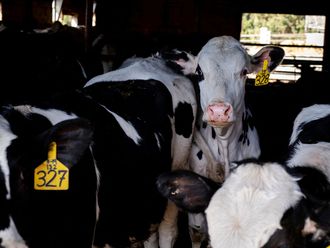Washington: Democratic presidential candidate Hillary Rodham Clinton announced Wednesday that she opposes an expansive 12-nation Pacific Rim free trade accord finalised by the Obama administration this week, breaking sharply with the president over a deal she had championed while serving as secretary of state.
Clinton said in an interview with PBS during a campaign stop in Iowa that she would not support the Trans-Pacific Partnership (TPP) based on what she knows of the deal so far. The 30-chapter text of the agreement, which negotiators concluded Monday, has not been made public.
“As of today, I am not in favour of what I have learnt about it,” Clinton said. “I have said from the very beginning that we had to have a trade agreement that would create good American jobs, raise wages and advance our national security. I still believe that’s the high bar we have to meet. I’ve been trying to learn as much as I can about the agreement, but I’m worried.”
Clinton’s opposition comes as she has sought to insulate herself against attacks from the left by rivals for the 2016 Democratic presidential nomination. Her stance aligns her with most of the Democratic Party, including Sen. Bernie Sanders, I-Vt., and former Maryland governor Martin O’Malley, her closest competitors on the campaign trail.
But her stance is a significant blow to the White House because of her past support for the TPP deal as a cornerstone of the Obama administration’s efforts to deepen US engagement in Asia to counter China’s rise. While serving as the nation’s stop diplomat in Obama’s first term, Clinton hailed the accord as the “gold standard” of trade agreements during a speech in Australia in 2012.
Her reversal could complicate the path to final ratification in Congress for a trade pact that President Barack Obama has called central to cementing his domestic economic agenda and foreign policy strategy in Asia. Republican leaders, who have been more supportive of Obama’s trade agenda, have also raised concerns this week about the final pact.
The White House launched a public relations blitz hours after the deal was completed, hoping to build support among lawmakers who are expected to vote on the pact early next year. Obama aides declined to comment on Clinton’s decision, but an administration official said Clinton had informed the White House of her intentions ahead of the interview.
Asked Tuesday whether the White House expected Clinton’s support, press secretary Josh Earnest said: “I would expect that she will take a look at the details of the agreement and arrive at her own conclusions. Certainly the administration would welcome her support, as well as the support of any other presidential candidates that wanted to come out in favour of the deal and urge Congress to support it. But ultimately, this will be a decision for her to make.”
In one possible sign of the White House’s concern, officials expedited the release Wednesday night of an administration analysis of the benefits for the TPP deal that was slated to be unveiled Thursday.
Administration officials said the accord would reduce or eliminate 18,000 tariffs on US products, including beef, dairy, rice and automobiles, and they pledged that the deal includes new labour and environmental provisions that would raise standards in countries such as Vietnam and Malaysia, which are among the 12 nations in the pact.
The TPP seeks to knit together the economies of countries, including Japan, Canada, Mexico and Australia, that represent 40 per cent of the world’s gross domestic product. The pact also would establish new regulations for the flow of information on the internet, establish a dispute-colony panel for multinational corporations and protect patents and copyrights for pharmaceutical drugs, music and movies.
In the interview with PBS, Clinton cited a lack of protections in the TPP against nations that have manipulated their currency rates and provisions dealing with market protections for next-generation drugs developed by US pharmaceutical companies.
“There are still a lot of unanswered questions,” she said.
Clinton’s break with Obama on trade is her latest attempt to distance herself from the president’s policies. She announced her opposition to the Keystone XL oil sands pipeline last month while the White House continues to deliberate. She renewed her criticism of Obama’s strategy in Syria after Russian troops established a military presence in that country. And she has advocated for using executive action to narrow loopholes on the sale of firearms at gun shows.
She hopes to consolidate support from the progressive wing of the party, including organised labour that has blamed US trade policies as contributing to a growing income gap. And Clinton’s position on trade is a bulwark against the possible candidacy of Vice President Joe Biden, who would have trouble distancing himself from the trade pact because of his role helping Obama round up support for it.
Sanders, who blasted the pact this week as a win for Wall Street, said he was “delighted” that Clinton was also opposing the pact.
“I’ll let the American people determine who has credibility or not,” he told reporters after addressing the Congressional Hispanic Caucus Institute. “I’m glad that she reached that conclusion. That’s a conclusion I reached from Day One.”
Others were more gleeful in rushing to highlight what the Republican National Committee called a “flip-flop.”
“Hillary Clinton’s painful waffling on TPP has been a case study in political expediency and is precisely why an overwhelming majority of Americans don’t trust her,” RNC Chairman Reince Priebus said.
“Wow, that’s a reversal,” O’Malley said of Clinton. “I was against the Trans-Pacific Partnership months and months ago.”












